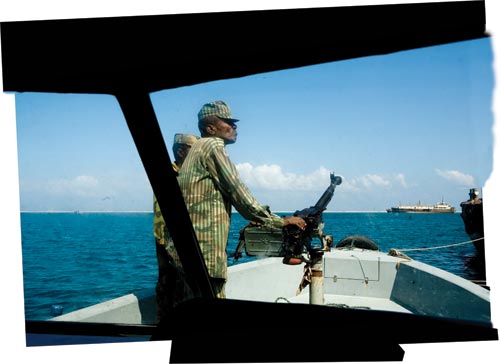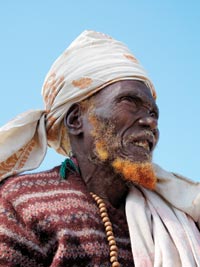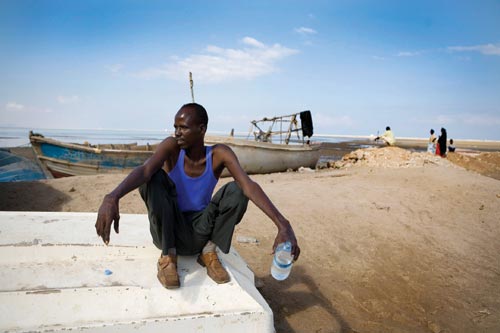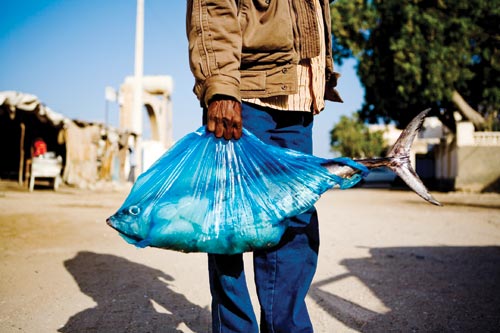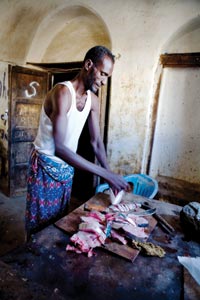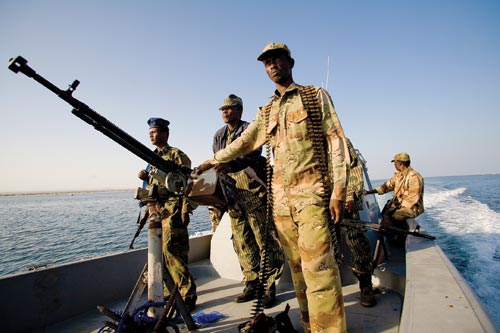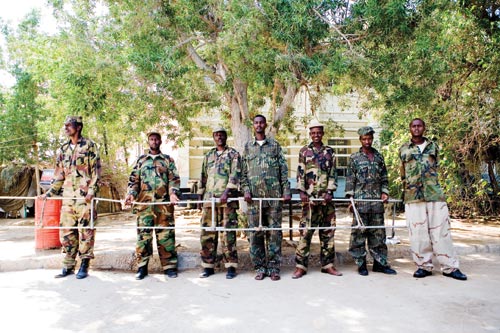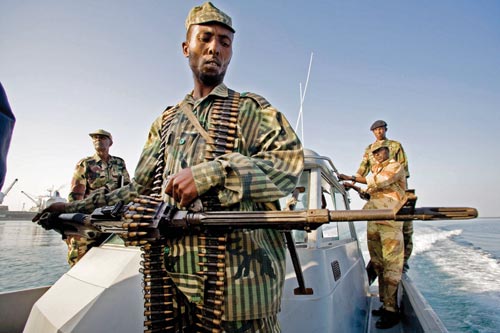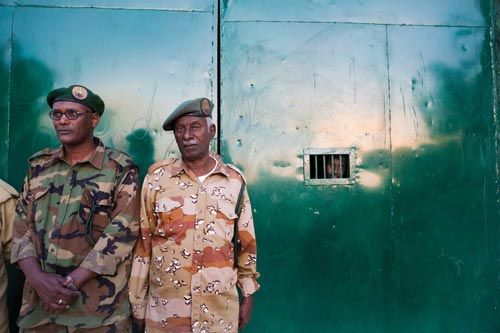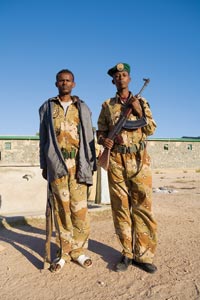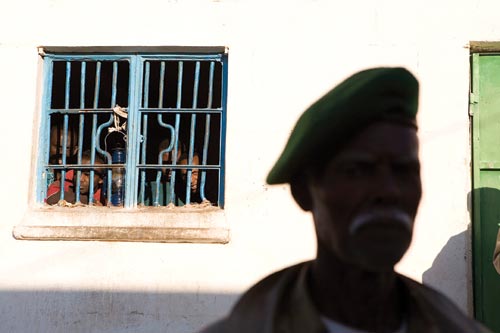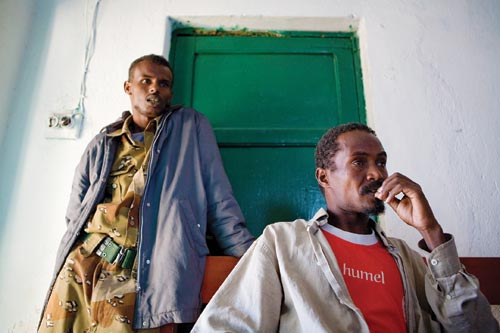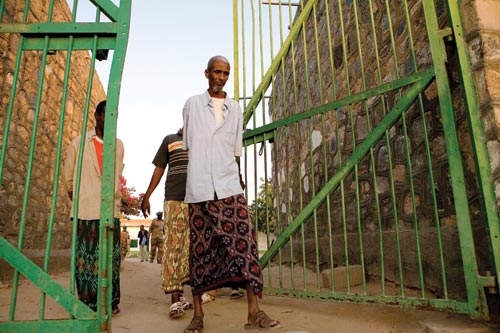The Somali port of Berbera lies against the Gulf of Aden, a semi-derelict relic of colonial times. Once the capital of British Somaliland, the city now has the feel of a Wild West ghost town. The European colonnades that shaded the bustling offices of port businesses are now half collapsed and keep the heat only from the abandoned bureaus of shipping companies and the crumbling shells of the empty fish markets. Men sit hunched on faded plastic chairs in the broken shade, chewing their way through bunches of khat leaves. A mildly narcotic plant that acts as a mental stimulant, khat arrives fresh daily from Ethiopia. It seems to be the only business working here these days. Men chew the plant into a green mush and talk of big plans that will never come to fruition. Nothing seems to move here anymore.
Dhows that once plied the Red Sea lay on their sides in the sandy streets—the planking all but stripped away, giving them the look of beached whales, rotted to empty ribs. Next to a concrete jetty a huge steel fishing boat crusted in barnacles and rust rests, motionless and pitched sideways, a permanent apparition of past economic glories. A deconstructed truck on perished tires, its mechanical guts stripped, waits on the beach for a ghost cargo to be loaded into its antique flatbed. At the foot of the jetty a group of men load fishing gear into a small open-top fiberglass dinghy, the sort of craft a Floridian would use to cruise around shallow mangrove swamps, not take out into the gulf.
Even in the best of times, Somalia really had only two sources of revenue—producing huge herds of goats and camels for export to the Gulf States and fishing. In the 1970s, the newfound wealth of the Gulf States produced a boom in demand for Somali meat, and the Soviets helped modernize the port in return for the right to build a naval station here. Soon Berbera was a major cargo port, but the Soviets moved their drydock to Aden in 1977 and outbreaks of foot and mouth disease decimated the livestock trade. Saudi Arabia grew so wary of meat imported from Berbera that the entire trade was eventually destroyed.
To make matters worse, amid the chaos of civil war and the botched UN intervention in the 1990s, fishing fleets from around the globe started convening in Somali waters to take advantage of the failing nation’s lack of a coast guard to police its shores. Foreign vessels from as far away as China operated high tech dragnets up to a mile long that scooped up everything indiscriminately, leaving Somali fishermen bobbing in their wake with empty nets. After years of overfishing, local crews setting off from the jetty in their dinghies have to scour the waters for up to a week just to bring in a catch big enough to cover their costs and feed their families.
Some, when they are no longer able to scratch out a living, turn to piracy. The lure of easy money and the chance to strike back at foreign vessels that have emptied their waters are powerful temptations, but the consequences are severe.
Off a bleak and rutted sand track, about thirty miles south of Berbera, lies Mandera, a desert prison built during the British occupation. Around its thick white perimeter walls is a scrappy village of brush huts that are adorned in the flayed fabrics of drying clothing and crisscrossed by wandering goats. The desert around is harsh, its gnarled trees and prickly bushes stretching toward a horizon of jutting brown mountains. These huts are home to the prison guards and their families. The compound’s faded whitewashed walls confine some three hundred men, most serving life terms for murder. But alongside these convicted killers are five men imprisoned for piracy, serving the first year of fifteen-year sentences.
One man, called Farah, is a professional corsair from the pirate haven of Bossaso in the Puntland region. Unremorseful, he insists his actions were not illegal but sanctioned by the Somali government—but in Somalia, where three governments operate simultaneously in three regions, it’s not clear which one he means. The other four men, sullen and tearful, are not professional pirates but impoverished fisherman, recruited by Farah for their nautical skills and their desperation. It was their first attempt at piracy. They had barely left the port of Berbera when they were captured by the Somaliland coast guard. Their plan, they believe, was leaked to the authorities, because they had failed to pay off the right clan leader or government official. It’s hard to believe they could have been caught any other way.
At the port of Berbera, I had seen three small, out-of-date gunmetal gray Russian-made boats with ancient antiaircraft guns mounted on their decks. These sad little cruisers, tethered to the quay and manned by alert young men bedecked in camouflage and weighed down with ammunition belts, are the sum of the Somaliland coast guard. They like to show off the spoils of their work, the trophies they have captured from pirates—a long wobbly ladder cobbled from pipes and hooked onto a targeted vessel, a distressed looking outboard motor, and a tattered twelve-foot fiberglass launch that looked more like the artifact of a nautical graveyard than a pursuit craft manned by ruthless pirates. With hardly enough fuel for the anti-piracy team to cruise around the harbor, the coast guard’s hands are tied. Although their capture of Farah and his fishermen-pirates was a media coup, it only highlighted the fact that the country’s shattered infrastructure cannot really afford effective measures to control piracy. And, in the way of so many corrupt nations, why would anyone in authority want to see a clampdown on criminality when they are often the benefiting hands behind it?


